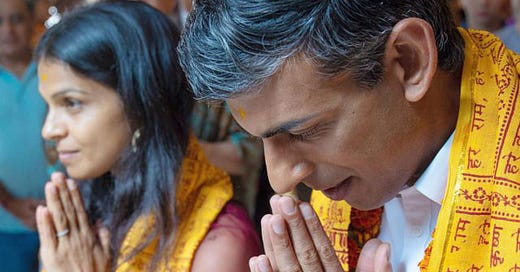This essay was published by the indianaffairs.com at https://theindianaffairs.com/en/hindus-the-diaspora-and-the-rishi-sunak-phenomenon/
Now that the euphoria over the ascent of Rishi Sunak to the position of Prime Minister of the United Kingdom has died down a little, it is worthwhile to consider the implications. On the one hand, there is understandable pride that someone in the diaspora has done well: I remember how delighted all of us were when V S Naipaul got his Nobel Prize in literature.
On the other hand, what is the tangible value to India of Sunak’s rapid rise to the leadership of what is, let us be honest, a racist, white-supremacist, imperial nation that is staring at the edge of an economic precipice? I was personally relieved a month or so ago when Sunak lost the leadership race to Liz Truss, simply because the rot is so bad in Britain that not even superhuman efforts are going to save the country from ruin.
My argument was that Sunak had dodged a bullet: whoever ended up as PM would inherit such an impossible mess, such a tar baby, that they would forever be blamed for it, even if they were innocent bystanders. So why not let someone else, like Liz Truss, fall on the sword?
If it were Sunak, not only would he be blamed individually, but also, in priority order a) Hindus, b) Indians, c) brown people, d) Stanford MBAs. It was best all around, I said at the time, to let some white woman be the fall guy, as it were. And we saw exactly what happened to her in 44 days: humiliated, disgraced, kicked out of office, her political career probably ruined forever.
The sad thing is that nothing has changed now. After Brexit, the UK is merely a small “tribal”, “bad-toothed”, “flavour-starved” “sub-Scandinavian archipelago” as a hilarious critic on Twitter, @gathara, calls it. His/her “breaking news” about the West is a cheeky microscope turned back on the US, the UK etc by a Kenyan using the same demeaning language Western media uses for the rest of the world.
Janan Ganesh, a columnist at the FT, had a good insight: Britain is laboring under the illusion that it is the US, which can wield its currency as a weapon; failing which, it has its military with which to quell challengers. Britain has none of the above. It has also been living beyond its means. Now it is forced to sell its family silver just to survive. As an example, there was a recent accusation that British Air Force pilots were sent to train Chinese pilots; which would likely mean American military secrets were dished out as they went ‘open-kimono’.
There is a fair chance that Sunak, too, will go down the same way Truss did, and indeed Boris Johnson did: resigning in disgrace. But in any case, everybody will find their expectations of him will be unfulfilled. Indians naively believe Sunak will be nice to India. On the contrary, his job is to look out for Britain's interests. And he has many constraints on him.
For example, Sunak has brought back Suella Braverman, who had been sacked as Home Minister. She irritated Indians by being an arch-imperialist saying there were too many Indians overstaying their visas in the UK. Surely, he did to ensure domestic support and avoid schisms in his own party. And yes, Braverman is of Indian origin, too.
Remember that Rishi Sunak is a Briton and not an Indian, even though he is a practicing and devout Hindu. His personal faith cannot get in the way of his doing his job as PM. In fact, he may even have to be particularly harsh on India to fend off allegations of dual loyalties. I remember Indian managers in Silicon Valley doing the same thing: they were especially hard on their Indian employees just to appear ‘neutral’: over-compensation.
I am by no means saying that there’s nothing to celebrate in Sunak’s rise. I am also delighted when Indian-origin people do well in other countries, against the odds. Maybe it is an irrational bout of ethnic pride. And it is true that Indians, especially Hindus, are now becoming more visible in their countries of residence, through hard work and the efforts of ‘Tiger Mothers’.
I was reminded of this the other day when searching through my usual podcasts: I came across two Indian-Americans, although based on their accents they are both immigrants. One is the Pulitzer-winning oncologist Siddhartha Mukherjee speaking of his new book The Song of the Cell; the other is Nick Santhanam, a Silicon Valley investor and former McKinsey consultant, talking about his new book The Titanium Economy.
Then there’s the articulate Balaji Srinivasan, a visionary and crypto-evangelist who foresees the rise of distributed ‘network states’. And Saagar Enjeti, who runs an interesting podcast channel.
In a sense, Indians are following in the footsteps of Jews: they, too, leveraged their smarts, especially in medicine, finance and cinema, to rise to the top of the heap in the US. Indians are, interestingly, using medicine, finance and technology in their rise to wealth. Incidentally, the only other ethnic-minority PM ever in the UK was Benjamin Disraeli, a Jew.
I used to think there would be a natural alliance between Jews and Hindus, especially as both have been under relentless attack by the same Abrahamic groups. India was the only country to never to oppress Jewish residents, too. But now I am not so sure. Maybe it’s because Jews are, after all, Abrahamics themselves. And maybe they find themselves in competition with Hindus.
I am reminded of various Jews who are not exactly pro Hindu: Wendy Doniger, Sheldon Pollock, Amy Wax (a law professor), Amy Kazmin (former FT bureau chief in India). Kazmin, whom I befriended on Twitter, once gave me the generic equivalent of “But my best friend is a Jew” when I complained about her unsympathetic stance towards Hindus: “But I check my articles with a Hindu Kayastha”. The irony was apparently lost on her.
Similarly, Hindus are singularly unfortunate to not have allies, even though we are the last pagans standing. Some Buddhists are strongly anti-Hindu, as in the case of the Rev Zenji Nio, a Japanese. And we know about the Sikh diaspora and its Khalistan obsession. Yes, divide and rule has worked all too well.
Be that as it may, personally, I am irrationally happy when fellow-paisanos do well. I celebrated when Sundar Pichai and Satya Nadella rose in tech; I was a big fan of the late C K Prahalad. But let us be very clear: while they will do what they can for the mother country, the diaspora are not Indians, and their success is not tied to India. To them, India is increasingly remote, a distant memory. Their reality is America, or wherever they have chosen to make their home.
They have no skin in India’s game. India will rise mostly based on the efforts of those who live in the country. Rishi Sunak, ironically, has a stake in India because he’s married to Infosys Narayana Murthy’s daughter Akshata, and she owns about 1% of the company. Sunak is independently wealthy, though, having made his fortune on Wall Street and private equity.
But that’s about it: we can all be proud of Rishi Sunak, whose Hindu values have enabled him to prosper in a hostile white world, and he is unapologetic about his religion. But his rise to the top of the Anglosphere is not particularly a win for India. India will have to rise based on its own efforts, not because of any favors from anybody. Permanent interests, not permanent friends.
1270 words, 6 Nov 2022














Share this post